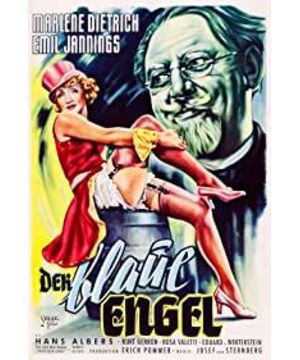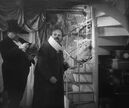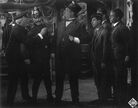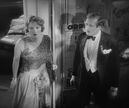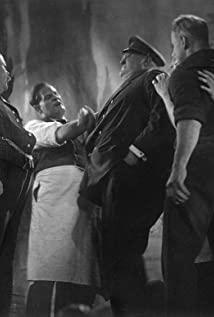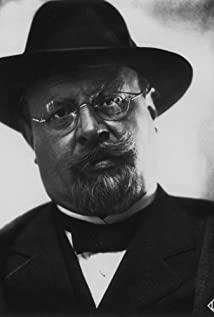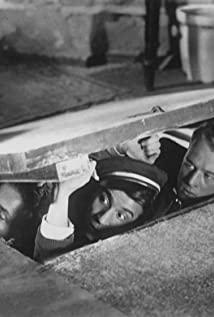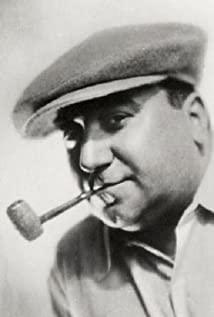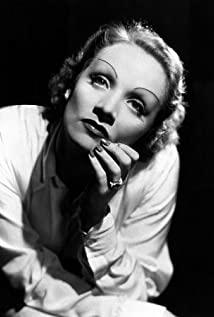Professor Manuel Rath is a very rigid and strict teacher. A class of his students sneaks to the cabaret at night, and the beautiful and charming Laura attracts everyone. Professor Emmanuel Rath, who went to the theater to find students, couldn't help falling in love with her, and married her after being expelled from school. After marriage, the depressed professor can only do clown work in the theater. Unable to accept the gap of identity and Laura's betrayal, the professor commits suicide in the classroom after going crazy. 1. (1) Pictorial At the beginning of this film, the professor's maid saw the poster of the Blue Angels at the door of the house. She also stood in front of the poster while cleaning, and imitated the movements in the poster to pose forgiving. And later in the school, students blow on Laura's skirt in the postcard while teasing the teacher on the teacher's notebook. The role of these clips: 1. To pave the way for the subsequent episode of the Blue Angels 2. It reflects the difference in representation between the Blue Angels and the school. The school represents depression and harshness, but the actions of the maid and the students are all reflected. The pursuit of sexy 3. It is a confrontation between sex and repression (2) Birdsong At the beginning of this film, the professor teased the bird with the sound from his mouth, but when he looked closer, he found that the bird was dead. But after the professor woke up at Laura's house for the first time, he heard the cheerful singing of the birds. The contrast between these two clips made the professor's life come alive from stagnant water. It can also be said that the caged bird is also a part of the professor, and the death of the bird may also imply the death of the professor. (3) Professor Professor, as the protagonist of this film, has a very rich portrayal of him. The professor is serious and strict. In class, he does not listen to the explanations of the students and blows his nose loudly, which may be a portrayal of power. And after he went to the Blue Angels for the first time and was seduced by Laura, his nose-blowing was no longer unscrupulous, and it also reflected his inner conscience, a kind of psychological change, until finally he was no longer powerless in the cacophony of the students. resistance. The relationship between the professor and the student may indicate that the professor is somewhat decadent, which is also part of the tragic ending that contributed to his character's doom. (4) Dancer and Angel In the pictorial of the Blue Angel, Laura showed a charming pose, and in her ankle, there was a little boy in the shape of a little angel holding her ankle. This picture is exactly the same as the professor drawn by the students on the blackboard after the professor and Laura spent the night. In this film, there are also many prominent pictures of the professor bowing down under Laura's pomegranate skirt, such as the professor picking up the cigarette that was knocked off due to nervousness on the bottom of Laura's feet, and wearing silk stockings for Laura. (5) The Clown As a character in the Blue Angels, the Clown does not show any redundant plot, and appears many times in the play, and even in some scenes, the clown just stands in the background, watching the story, and no one notices him. , and he rarely responded. It is hard not to say that the clown is a symbolic image, perhaps representing the generation and irresistibility of fatal desires in this film, and in the end, the clown has become the new identity of the professor, perhaps because the professor is driven by desire bring retribution. (six) The lyrics Laura sings several times are very suitable for the occasion. For example, when she meets the professor, or when she is performing, she sings "Blonde with all kinds of charm". What is special is that there is a song in the film with lyrics similar to " We fell in love the first time we met, and I regarded love as a plaything", which appeared once when the professor and Laura fell in love, and sang again when the professor was abandoned by Laura at the end. The emotions were different both times. For the first time, it was sweet and gentle (the professor also stared at the nude female sculpture on the side for a few seconds, and I think it also represents a burst of desire. The professor's performance here is really pure and unpretentious, so innocent and sweet Not too exaggerated), the second time is charming and unfeeling. (7) The magic professor finally became the magician's assistant. This result also has a very long context. When we first met, the professor met the magician because of similar clothes. At this time, Laura explained to the magician, He is a real professor, not a magician, which also paved the way for the professor to become a magician's assistant in the end, which further reflected the gap in the professor's identity. This gap has also become one of the reasons for the professor's madness. At the same time, at the wedding of Laura and the professor, the magician used an egg trick to let the professor learn how to croak unseemly under Laura's teasing, causing everyone to laugh. When the professor acted as a magic assistant, the magician wanted to This scene is reproduced, but the professor can't say it because he sees Laura's betrayal. Finally, the crazy chicken croaks and chases Laura and her lover. The love gap between Laura and him, Laura's betrayal also becomes the professor The second reason for madness. This magic scene is nothing more than a climax in the play, and in this climax, the two reasons for the professor's suicide are revealed at the same time, with great tension. (8) Every time the professor of suicide arrives at the school, he changes the scene through the sound of the school bell, and the revolving angel under the clock also brings people a sense of destiny. The only time I missed the bell was the night at Laura's house, which was also the point where the professor began to enter Laura's world, and in the end, the professor also died at the school's bell and returned to his own world again, where he died. He clung to the table, and never wanted to leave. 2. Audiovisual As a film in the early sound era, there are many deliberate parts in its use of sound. For example, as the door is opened and closed, the sound of off-site music gradually comes. There is almost no soundtrack in the whole film. Most of the bgm are From this. 3. The core may depict that people in different worlds are destined not to live well together, or it may just depict the process of the professor's irrepressible depravity because of his repressed desires being exposed. In any case, it is a tragedy destined to be fate. The magic professor finally became the magician's assistant. This result also has a long context. When we first met, the professor confronted the magician because of similar clothes. At this time, Laura explained to the magician that he was the real magician. The professor instead of the magician also paved the way for the professor to become the magician's assistant in the end, which further reflected the gap in the professor's identity. This gap has also become one of the reasons for the professor's madness. At the same time, at the wedding of Laura and the professor, the magician used an egg trick to let the professor learn how to croak unseemly under Laura's teasing, causing everyone to laugh. When the professor acted as a magic assistant, the magician wanted to This scene is reproduced, but the professor can't say it because he sees Laura's betrayal. Finally, the crazy chicken croaks and chases Laura and her lover. The love gap between Laura and him, Laura's betrayal also becomes the professor The second reason for madness. This magic scene is nothing more than a climax in the play, and in this climax, the two reasons for the professor's suicide are revealed at the same time, with great tension. (8) Every time the professor of suicide arrives at the school, he changes the scene through the sound of the school bell, and the revolving angel under the clock also brings people a sense of destiny. The only time I missed the bell was the night at Laura's house, which was also the point where the professor began to enter Laura's world, and in the end, the professor also died at the school's bell and returned to his own world again, where he died. He clung to the table, and never wanted to leave. 2. Audiovisual As a film in the early sound era, there are many deliberate parts in its use of sound. For example, as the door is opened and closed, the sound of off-site music gradually comes. There is almost no soundtrack in the whole film. Most of the bgm are From this. 3. The core may depict that people in different worlds are destined not to live well together, or it may just depict the process of the professor's irrepressible depravity because of his repressed desires being exposed. In any case, it is a tragedy destined to be fate. The magic professor finally became the magician's assistant. This result also has a long context. When we first met, the professor confronted the magician because of similar clothes. At this time, Laura explained to the magician that he was the real magician. The professor instead of the magician also paved the way for the professor to become the magician's assistant in the end, which further reflected the gap in the professor's identity. This gap has also become one of the reasons for the professor's madness. At the same time, at the wedding of Laura and the professor, the magician used an egg trick to let the professor learn how to croak unseemly under Laura's teasing, causing everyone to laugh. When the professor acted as a magic assistant, the magician wanted to This scene is reproduced, but the professor can't say it because he sees Laura's betrayal. Finally, the crazy chicken croaks and chases Laura and her lover. The love gap between Laura and him, Laura's betrayal also becomes the professor The second reason for madness. This magic scene is nothing more than a climax in the play, and in this climax, the two reasons for the professor's suicide are revealed at the same time, with great tension. (8) Every time the professor of suicide arrives at the school, he changes the scene through the sound of the school bell, and the revolving angel under the clock also brings people a sense of destiny. The only time I missed the bell was the night at Laura's house, which was also the point where the professor began to enter Laura's world, and in the end, the professor also died at the school's bell and returned to his own world again, where he died. He clung to the table, and never wanted to leave. 2. Audiovisual As a film in the early sound era, there are many deliberate parts in its use of sound. For example, as the door is opened and closed, the sound of off-site music gradually comes. There is almost no soundtrack in the whole film. Most of the bgm are From this. 3. The core may depict that people in different worlds are destined not to live well together, or it may just depict the process of the professor's irrepressible depravity because of his repressed desires being exposed. In any case, it is a tragedy destined to be fate. Every time Professor Suicide arrives at the school, he changes the scene through the sound of the school bell, and the revolving angel under the clock also brings a sense of destiny. The only time I missed the bell was the night at Laura's house, which was also the point where the professor began to enter Laura's world, and in the end, the professor also died at the school's bell and returned to his own world again, where he died. He clung to the table, and never wanted to leave. 2. Audiovisual As a film in the early sound era, there are many deliberate parts in its use of sound. For example, as the door is opened and closed, the sound of off-site music gradually comes. There is almost no soundtrack in the whole film. Most of the bgm are From this. 3. The core may depict that people in different worlds are destined not to live well together, or it may just depict the process of the professor's irrepressible depravity because of his repressed desires being exposed. In any case, it is a tragedy destined to be fate. Every time Professor Suicide arrives at the school, he changes the scene through the sound of the school bell, and the revolving angel under the clock also brings a sense of destiny. The only time I missed the bell was the night at Laura's house, which was also the point where the professor began to enter Laura's world, and in the end, the professor also died at the school's bell and returned to his own world again, where he died. He clung to the table, and never wanted to leave. 2. Audiovisual As a film in the early sound era, there are many deliberate parts in its use of sound. For example, as the door is opened and closed, the sound of off-site music gradually comes. There is almost no soundtrack in the whole film. Most of the bgm are From this. 3. The core may depict that people in different worlds are destined not to live well together, or it may just depict the process of the professor's irrepressible depravity because of his repressed desires being exposed. In any case, it is a tragedy destined to be fate.
It's too awful. . We teach. . So sweet when in love. . i feel pity
View more about The Blue Angel reviews


